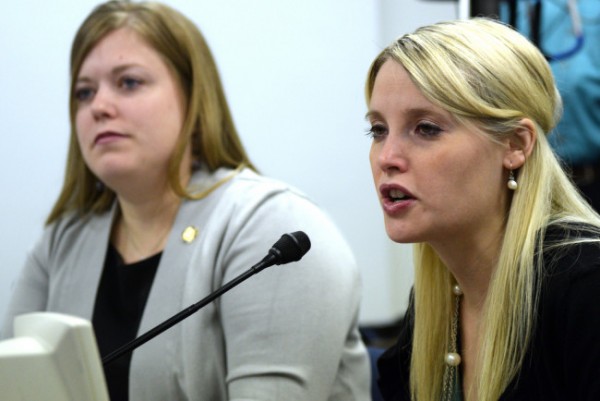Gov. Bill Walker signed the Alaska Safe Children’s Act Thursday in Anchorage. The bill, also known as Erin’s Law, was controversial for some and stalled by a legislature that was at odds regarding the state’s fiscal situation. While the fight over Erin’s Law may be done, two lawmakers who worked on the bill say there is still more to be accomplished.

The Alaska Safe Children’s Act requires school districts to provide age-appropriate child sexual assault, teen dating and youth suicide prevention curricula to all students. It includes a provision adopted from Bree’s Law that mandates teen dating violence education in middle schools and high schools. The bill’s primary sponsor, Rep. Charisse Millett of Anchorage, says the act is a catalyst and not the end solution. She thinks the legislature is ready to continue addressing Alaska’s high rates of child sexual abuse.
“Now that we’ve elevated the conversation I think most legislators that I’ve spoken with are looking for that next step, and I think the next step is finding a funding source and putting a good, solid program in place that’s good for urban and good for rural Alaska. It’s paramount that we address the core issue,” Millett said.
Millett said she’s working on a few ideas for legislation that would create a more comprehensive support system for children and teens who are victims of violence. As with Erin’s Law, the issue of funding will be front and center.

A bill recently introduced in Congress would fund the implementation of child sexual abuse and teen dating safety curriculum in states where Erin’s Law or a similar piece of legislation has been adopted. The funding would go a long way to help the State of Alaska, which is currently grappling with an operating budget that’s outgrown available revenue.
During the legislative session, some lawmakers spoke against Erin’s Law, calling it an unfunded mandate and a burden to schools that are trying to operate with limited funding. But Anchorage Rep. Geran Tarr says people are starting to realize that prevention is the most fiscally prudent solution to Alaska’s problems with violence. Tarr originally introduced Erin’s Law in 2014, and was a co-sponsor of Millett’s bill.
“What everyone is recognizing — and if they haven’t I hope they will soon — these are really the low-cost alternatives,” Tarr said. “When you talk about something like an unfunded mandate I think Jeff Jessee from the Mental Health Trust said it very well this session where he said, ‘The real unfunded mandate is all the problems that come later.’”
The list of problems children face after experiencing violence or sexual abuse at home is extensive. Countless studies have shown that children who are harmed at home are more likely to have emotional and social problems, struggle academically and be involved in the juvenile justice system.
As adults, they are more likely to be re-victimized or become perpetrators themselves. Substance abuse and mental health problems can also worsen without intervention.
Alaska has some of the nation’s highest rates for domestic violence, rape and child abuse and neglect. The Alaska Safe Children’s Act is one of the state’s most substantial pieces of legislation aimed at addressing some of those problems, and Millett says it passed largely because of Rep. Tarr and Gov. Bill Walker, who advocated passage of the bill in his first address to the legislature.
“Credit goes to Geran for starting this battle last year and Gov. Walker for really putting the force behind the legislation. It was an incredible process,” Millett said. “It was obviously frustrating, but in the end it passed and we’re moving forward.”
The Alaska Safe Children’s Act created a task force which is responsible for the law’s implementation. Schools have until 2017 to comply with the law; that’s the deadline for the task force to develop the program’s curricula.
Jennifer Canfield is a reporter at KTOO in Juneau.




